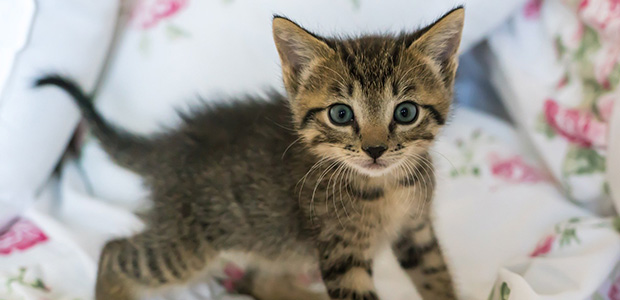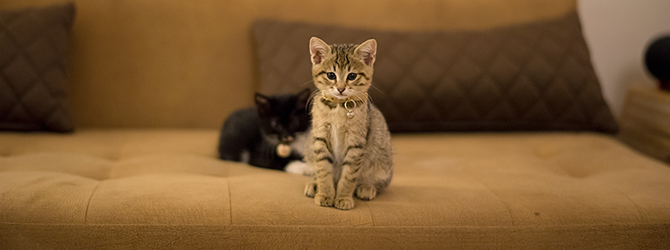How to kitten-proof your home
First Published: 26/02/2020
Last Updated: 17/10/2023
Are you welcoming a new kitten or rescue cat to the family?
It’s important to make sure your house is as safe as possible, so your furry friend doesn’t break anything or cause serious harm to themselves or others.
Breakable objects
Kittens are notoriously curious creatures. Before they’re allowed to venture outside, they’ll be keen to explore your home. Make sure they’re not tempted by dangling objects like tablecloths or blinds; the same goes for ornaments and vases.
During your first few weeks of kitten ownership, it’s a good idea to hide away your valuable objects – behind a locked door or secure cupboard if possible. You may wish to invest in some locks for your cupboard doors.
Dangerous chemicals
Cats love the taste of certain household chemicals, such as antifreeze, but it’s highly toxic to them. Keep them safe by storing such products well out of their reach.
Be careful when you’re cleaning, too. If you’ve left toilet cleaner in the toilet or just mopped the kitchen floor, keep your cat out of the room until the chemical has dried.
Anything they can chew or eat
When you take a look around your house, don’t just search for things your cat might damage, think of things they might try to eat, too.
Keep your floors nice and clean – free of bobbles, elastic bands, bits of children’s toys etc. The same goes for live wires and cables. Never leave your kitty alone with these; if you’re heading out, turn off your electrical appliances.
Many plants, such as lilies, are poisonous to cats. Read our list of common cat poisons to help keep your kitty safe.

Gaps, windows and escape routes
Cats are natural escapologists, so make sure you close off all possible exits!
Close windows, the oven, the washing machine, your drawers, your kitchen cupboards, the bin and make sure any large vases are either covered or hidden out of sight.
When your cat is old enough to go outside, consider having a cat flap fitted. Some cat flaps can scan your cat’s microchip, making sure that your cat is the only one that can get in and out.
Toys and distractions
Playful, exploratory behaviour is natural in kittens. The best way to stop your cat from getting bored is to provide them with lots of toys to play with.
Scratch posts, complete with lots of accessories, will satisfy their need to use their paws. Cardboard boxes can also provide endless fun. Likewise, toys and games will keep their mind occupied by giving them something to chase and interact with.
Need more info?
For more help and advice on kitten-proofing your home, or any aspect of getting a new cat, have a chat with your local vet.
Find your nearest vet using our Find a Vet page, or speak to a vet online using Online Vets.



